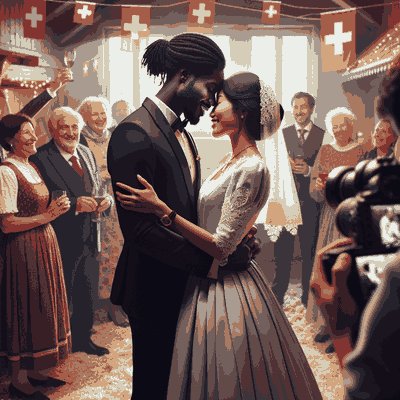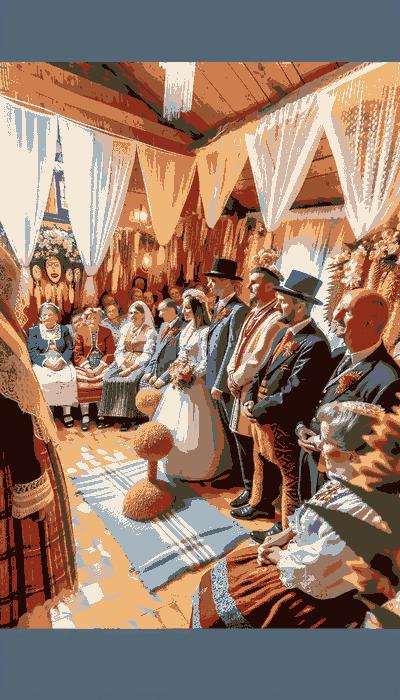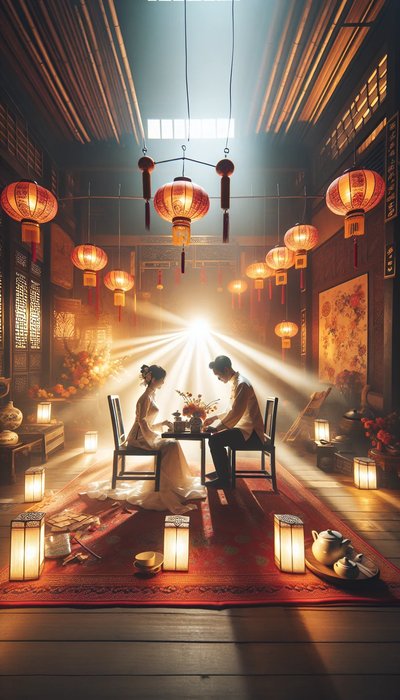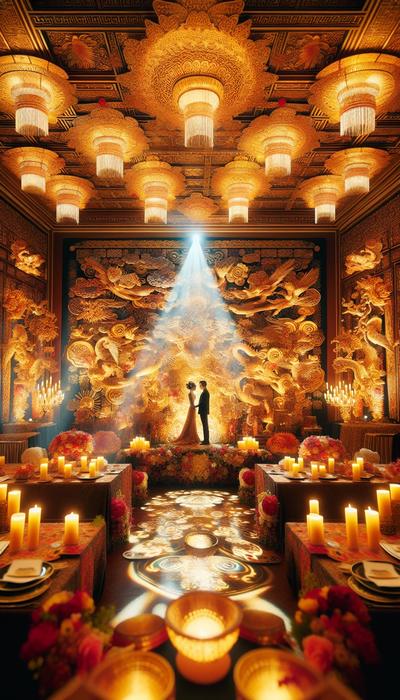Swiss Wedding Traditions
Swiss wedding traditions are centuries-old customs combining religious ceremonies, nature-based rituals, and regional celebrations that typically span 2-3 days and involve 100-200 guests. These traditions encompass mandatory civil ceremonies, optional religious services, distinctive customs like log-sawing challenges and evergreen paths, creating multicultural celebrations that cost between CHF 20,000-50,000 ($22,000-55,000 USD).

Complete Swiss Wedding Process Timeline

- 12-18 months before: Engagement announcement and family gatherings
- 6-9 months before: Civil ceremony booking at local Standesamt (registry office)
- 3-6 months before: Church/venue reservations and guest list finalization
- 1-3 months before: Bachelor/bachelorette parties (Junggesellenabschied)
- Wedding week: Civil ceremony followed by religious ceremony (if chosen)
- Wedding day: Reception with 100-150 guests for apéritif, 50-80 for dinner
- Post-wedding: Home decoration pranks and honeymoon
Pre-Wedding Traditions and Ceremonies

What Are Swiss Engagement Customs?
Swiss engagement customs are formal family celebrations marking a couple’s decision to marry, traditionally involving both families meeting to approve the union and exchange gold rings worth CHF 500-2,000 ($550-2,200 USD). This centuries-old practice originated in medieval times when marriages required formal family agreements and financial negotiations between households.
Key engagement elements include:
- Gold engagement rings: CHF 500-2,000 per ring
- Family gathering: 20-40 close relatives
- Formal announcement: Published in local newspapers
- Engagement party: Costs CHF 1,000-3,000
Regional variations exist across Switzerland’s linguistic regions:
- German-speaking regions emphasize formal protocols
- French-speaking areas favor elegant receptions
- Italian-speaking Ticino includes larger family gatherings
- Romansh areas maintain unique linguistic traditions
Modern practice sees 75% of Swiss couples hosting engagement celebrations, though with less formality than previous generations. Contemporary couples often combine traditional gold bands with diamond rings, spending an average of CHF 3,000-5,000 on engagement jewelry.
Swiss Bachelor and Bachelorette Party Traditions
Junggesellenabschied is the Swiss-German term for bachelor/bachelorette parties that traditionally focus on meaningful farewells to single life rather than excessive partying, typically involving 10-20 close friends over 1-2 days. This practice differs from American-style celebrations by emphasizing quality experiences and friendship bonds.
Traditional elements include:
- Duration: 1-2 days (weekend trips common)
- Participants: 10-20 close friends
- Budget: CHF 200-500 per person
- Activities: Spa weekends, mountain hikes, wine tastings
Modern adaptations incorporate international influences while maintaining Swiss restraint. Popular contemporary options include:
- Wellness weekends in Swiss Alps (CHF 300-600 per person)
- City breaks to European destinations (CHF 400-800 per person)
- Adventure activities like paragliding (CHF 150-300 per person)
- Wine tours in local vineyards (CHF 100-200 per person)
Wedding Attire and Traditional Dress

What Is the Swiss Bridal Crown Tradition?
The Swiss bridal crown (Brautkrone) is a traditional floral or metallic wreath worn by brides representing maidenhood and purity, ceremonially removed or burned after vows to symbolize the transition to married life. This Alpine tradition dates back over 500 years and remains practiced in 30% of traditional Swiss weddings.
Components of traditional bridal attire:
- Bridal crown/wreath: CHF 100-500
- White wedding dress: CHF 1,500-5,000
- Traditional elements: Edelweiss flowers, embroidered details
- Regional accessories: Vary by canton
Regional dress variations reflect Switzerland’s diverse cultural heritage:
- Alpine regions: Incorporate Trachten elements (folk costume details)
- Urban centers: International designer influences predominate
- French-speaking areas: Parisian fashion influences
- Italian-speaking Ticino: Mediterranean styling elements
Current practice shows 85% of Swiss brides choosing contemporary white gowns while 30% incorporate traditional elements like crowns or regional embroidery. The average Swiss bride spends CHF 2,000-4,000 on wedding attire, emphasizing quality fabrics and craftsmanship over ostentation.
Wedding Ceremony Requirements and Traditions

Swiss Civil Ceremony Requirements (Standesamtliche Trauung)
The Standesamtliche Trauung is Switzerland’s mandatory civil marriage ceremony conducted at a registry office that legally validates all marriages regardless of religious affiliation, typically lasting 20-30 minutes with 10-20 attendees. This requirement, unique among European countries, reflects Switzerland’s strict separation of church and state since 1874. Civil ceremony essentials:
- Cost: CHF 300-500 (varies by canton)
- Duration: 20-30 minutes
- Attendees: 10-20 close family and witnesses
- Required documents: 5-8 official papers
- Booking timeline: 2-6 months in advance
Procedure requirements include:
- Valid passports or ID cards for both partners
- Birth certificates (translated if foreign)
- Certificate of no impediment to marriage
- Divorce decree (if applicable)
- Minimum two witnesses over age 18
Modern practice sees couples increasingly treating civil ceremonies as intimate celebrations rather than mere formalities. Popular registry office locations include:
- Historic town halls (Zurich, Bern)
- Castle venues (CHF 500-1,500 rental)
- Lakeside locations (Geneva, Lucerne)
- Mountain registry offices (Zermatt, St. Moritz)
Religious Wedding Ceremonies in Switzerland
Swiss religious ceremonies are optional celebrations following the mandatory civil ceremony, having no legal standing but providing spiritual significance for 65% of Swiss couples who choose church weddings lasting 45-90 minutes. These ceremonies reflect Switzerland’s religious diversity with Catholic (38%), Protestant (26%), and other faiths represented.
Religious ceremony components:
- Duration: 45-90 minutes
- Guests: 50-200 attendees
- Church fees: CHF 200-1,000
- Music/organist: CHF 300-800
- Decorations: CHF 500-2,000
Regional religious patterns:
- Central Switzerland: 70% Catholic ceremonies
- Zurich/Bern regions: 60% Protestant services
- Ticino: 80% Catholic traditions
- Urban areas: 40% choose non-religious venues
The Agape Ritual Tradition
The Agape ritual is a Swiss-Catholic wedding tradition involving communal sharing of bread and wine immediately after the ceremony, symbolizing unity between all social classes and typically serving 100-150 guests. This ancient Christian “love feast” creates a transitional moment between formal ceremony and reception festivities.
Agape ceremony elements:
- Timing: Immediately post-ceremony (15-30 minutes)
- Participants: All ceremony attendees
- Cost: CHF 5-10 per guest
- Components: Bread, white wine, simple appetizers
- Symbolic meaning: Unity, love, community inclusion
Current implementation adapts this tradition for modern weddings:
- Champagne often replaces traditional white wine
- Canapés supplement symbolic bread
- Outdoor settings for good weather
- Indoor alternatives at ceremony venues
Distinctive Post-Ceremony Traditions
The Swiss Log-Sawing Ceremony (Baumstamm Sägen)
Baumstamm Sägen is Switzerland’s iconic wedding tradition where newlyweds must cooperatively saw through a log using a two-person saw, symbolizing their first challenge as a married couple and demonstrating teamwork abilities. This 200-year-old custom, shared with Germany and Austria, remains practiced at 60% of Swiss weddings, particularly in German-speaking regions.
Log-sawing ceremony details:
- Log size: 30-50cm diameter
- Sawing duration: 5-15 minutes
- Guest participation: Cheering and timing
- Photo opportunities: Highly Instagram-worthy
- Symbolic meaning: Overcoming obstacles together
Modern variations include:
- Decorated logs with couple’s initials
- Smaller logs for elderly couples
- Alternative “first task” options for accessibility
- Professional photographers capturing the moment
Burning the Bridal Crown Ceremony
The crown burning ritual is a traditional Swiss ceremony where the bride’s floral wreath is ceremonially burned after vows, with quick burning indicating good fortune for the marriage. This ancient Alpine tradition symbolizes the transformation from maiden to wife and remains practiced in 20% of traditional Swiss weddings.
Ceremony components:
- Timing: Immediately after religious vows
- Duration: 5-10 minutes
- Participants: Bride, groom, wedding party
- Safety measures: Controlled outdoor setting
- Alternative: Crown removal without burning
Regional variations:
- Alpine regions maintain full burning tradition
- Urban areas often skip for safety reasons
- Some couples preserve crown as keepsake
- Modern LED crowns offer safe alternatives
Swiss Tree-Planting Traditions
The Swiss tree-planting ceremony involves newlyweds planting an evergreen tree (typically pine) after their wedding to symbolize fertility, growth, and establishing roots together, with 40% of couples incorporating this eco-friendly tradition. This centuries-old custom connects marriage to Switzerland’s natural landscape and environmental values.
Tree-planting tradition elements:
- Tree type: Pine, fir, or spruce saplings
- Cost: CHF 50-200 for tree and planting
- Location: Family property or designated areas
- Timing: During reception or next day
- Long-term care: Couple tends tree together
Contemporary adaptations:
- Donating to reforestation projects (CHF 100-500)
- Planting at wedding venue gardens
- Creating couple’s forest over years
- Virtual tree adoption certificates
Wedding Reception Traditions and Entertainment
Swiss Wedding Reception Structure
Swiss wedding receptions follow a distinctive two-part structure with an afternoon apéritif for 100-150 guests followed by an evening dinner for 50-80 close friends and family, typically lasting 8-12 hours total. This format, costing CHF 15,000-40,000, reflects Swiss appreciation for extended celebrations and quality time with guests.
Reception timeline and costs:
- 2-4 PM: Post-ceremony apéritif (CHF 50-80 per guest)
- 4-7 PM: Guest entertainment and games
- 8 PM: Formal dinner begins (CHF 120-200 per guest)
- 10 PM-2 AM: Dancing and celebrations
- Total duration: 8-12 hours
Apéritif components:
- Champagne or regional wines
- 8-12 types of canapés
- Standing reception format
- Mingling and congratulations
- CHF 5,000-12,000 typical cost
Dinner elements:
- 4-7 course meal
- Assigned seating
- Speeches between courses
- Dancing after dessert
- CHF 10,000-25,000 typical cost
Amateur Entertainment Traditions
Swiss wedding entertainment uniquely features elaborate amateur performances by guests including songs, skits, games, and presentations coordinated by the wedding party, filling 2-4 hours between apéritif and dinner. This distinctive tradition, found at 80% of Swiss weddings, creates memorable personalized celebrations.
Typical entertainment elements:
- Duration: 2-4 hours of programming
- Participants: 20-40% of guests perform
- Coordination: Best man and maid of honor organize
- Types: Songs, poems, skits, games, slideshows
- Props/costumes: Often elaborate preparations
Popular performance examples:
- Workplace colleagues creating themed skits
- Sports teams performing synchronized routines
- Family members singing adapted songs
- Childhood friends sharing embarrassing stories
- Musical performances by talented guests
Modern considerations:
- Professional sound systems needed
- Backup entertainment plans
- Time management crucial
- Mix of languages in multilingual celebrations
Spalierstehen (Formation Standing) Tradition
Spalierstehen is the Swiss-German tradition where colleagues or teammates form a ceremonial corridor for newlyweds to walk through, typically involving 20-50 uniformed participants from the couple’s workplace, sports clubs, or associations. This practice, called “faire la haie” in French regions, remains practiced at 70% of Swiss weddings.
Formation ceremony details:
- Participants: 20-50 colleagues/teammates
- Duration: 10-15 minutes
- Location: Church/venue exit
- Props: Professional uniforms, equipment
- Timing: Immediately post-ceremony
Common formations by group:
- Sports teams: Full uniforms with raised equipment
- Military/police: Dress uniforms with ceremonial swords
- Medical staff: White coats with symbolic items
- Firefighters: Full gear with crossed ladders
- Musicians: Instruments creating musical archway
Regional Wedding Variations Across Switzerland
German-Speaking Swiss Wedding Traditions
German-Swiss weddings emphasize structured traditions like log-sawing ceremonies, formal timelines, and alpine customs, with celebrations in cantons like Zurich, Bern, and Lucerne averaging CHF 35,000-45,000 for 120-150 guests. These regions, representing 65% of Switzerland’s population, maintain the strongest adherence to traditional customs.
Distinctive German-Swiss elements:
- Log-sawing ceremony: 80% participation rate
- Traditional music: Alphorn and accordion performances
- Structured timeline: Precise scheduling maintained
- Folk elements: 40% incorporate Trachten details
- Average costs: CHF 35,000-45,000
Modern adaptations in German regions:
- Urban Zurich weddings blend international trends
- Rural areas maintain stronger traditions
- Bilingual ceremonies increasingly common
- Traditional and contemporary music mixed
French-Speaking Swiss Wedding Customs
Romande wedding traditions in western Switzerland emphasize elegance, gastronomy, and wine culture, with Geneva and Lausanne celebrations averaging CHF 40,000-60,000 for sophisticated receptions of 100-130 guests. These regions, representing 25% of Switzerland, show stronger French cultural influences.
French-Swiss characteristics:
- Emphasis: Culinary excellence and wine
- Style: Sophisticated, elegant celebrations
- Duration: Extended dinner celebrations (5-7 hours)
- Wine focus: Local vineyard selections featured
- Average costs: CHF 40,000-60,000
Regional specialties:
- Lake Geneva venue preferences (CHF 5,000-15,000)
- Lavaux vineyard receptions
- French-influenced cuisine
- Champagne preferences over beer
Italian-Speaking Swiss (Ticino) Traditions
Ticino wedding celebrations blend Swiss precision with Italian warmth, featuring Mediterranean cuisine, expressive celebrations, and Catholic traditions for 80-120 guests at costs of CHF 30,000-50,000. This southern canton, representing 8% of Switzerland, creates unique multicultural wedding experiences.
Ticino wedding elements:
- Cuisine: Pasta, risotto, and seafood featured
- Style: Warmer, more expressive celebrations
- Music: Italian songs and traditional dancing
- Duration: Extended late-night celebrations
- Catholic influence: 80% include religious elements
Distinctive features:
- Larger guest lists than German regions
- Multiple food courses (6-8 common)
- Grappa and limoncello traditions
- Lakeside venue preferences
Modern Swiss Wedding Costs and Statistics
Comprehensive Wedding Budget Breakdown
Average Swiss wedding costs range from CHF 30,000-50,000 ($33,000-55,000 USD) for 100-150 guests, making Switzerland one of Europe’s most expensive wedding destinations. These costs reflect high Swiss living standards and emphasis on quality over quantity.
Detailed cost breakdown:
- Venue rental: CHF 3,000-8,000
- Catering: CHF 150-250 per guest
- Photography/video: CHF 3,000-6,000
- Music/DJ: CHF 1,500-3,000
- Flowers: CHF 2,000-4,000
- Attire: CHF 3,000-6,000
- Rings: CHF 4,000-8,000
- Miscellaneous: CHF 3,000-5,000
Regional cost variations:
- Zurich/Geneva: 20-30% above average
- Rural areas: 10-20% below average
- Mountain venues: Premium pricing
- Off-season: 15-25% discounts available
Current Popularity of Swiss Wedding Traditions
Based on 2024-2025 wedding industry data, here’s the current observance of Swiss traditions:
Nearly Universal (90-100% of weddings):
- Civil ceremony requirement (legally mandatory)
- Structured reception format (apéritif + dinner)
- Spalierstehen/formation standing (70%)
- Regional wine and food focus (85%)
Very Common (50-70% of weddings):
- Amateur guest entertainment (65%)
- Log-sawing ceremony (60% in German regions)
- Religious ceremonies (55% overall)
- Nature-inspired decorations (70%)
Moderately Practiced (20-50%):
- Tree planting ceremonies (40%)
- Traditional bridal crown (30%)
- Agape ritual (35% of religious weddings)
- Bride “kidnapping” games (25%)
Declining Traditions (Under 20%):
- Crown burning ceremony (15%)
- Handkerchief exchange (10%)
- Home decoration pranks (20%)
- Full traditional costume (5%)
Swiss-Themed Destination Weddings
Incorporating Swiss Traditions Abroad
Swiss-themed destination weddings allow couples to honor Swiss heritage while marrying abroad, incorporating elements like symbolic log-sawing, Alpine decorations, and Swiss cuisine into celebrations costing $15,000-40,000 USD. Popular destinations include Las Vegas, Caribbean resorts, and European cities accommodating Swiss cultural elements.
Adaptable Swiss elements for destination weddings:
- Ceremonial components: Modified log-sawing, symbolic tree planting
- Decorative themes: Edelweiss flowers, Alpine imagery
- Culinary offerings: Chocolate displays, fondue stations
- Musical elements: Recorded alphorn music
- Favors: Swiss chocolate, cowbells, mini Swiss flags
Cost considerations:
- Swiss element packages: $500-2,000
- Specialty decorations: $1,000-3,000
- Swiss food stations: $30-50 per guest
- Cultural ceremony additions: $300-800
Swiss-Themed Las Vegas Wedding Options
Las Vegas Swiss-themed weddings combine traditional Swiss elements with Vegas excitement, available at major hotels and chapels for $5,000-25,000, offering unique cultural fusion celebrations. These packages adapt Swiss customs for desert settings while maintaining cultural significance.
Las Vegas Swiss wedding components:
- Venue options: Major hotels with customization
- Ceremony adaptations: Indoor log-sawing, Alpine décor
- Reception elements: Fondue stations, Swiss wines
- Entertainment: Swiss music mixed with Vegas shows
- Photo opportunities: Alpine backdrops available
Popular Vegas venues for Swiss themes:
- Luxury hotel chapels: $2,000-10,000
- All-inclusive packages: $5,000-15,000
- Reception venues: $10,000-30,000
- Swiss chef consultations available
- Custom decoration services
Modern adaptation benefits:
- No language barriers
- Simplified planning process
- Cost savings versus Swiss venues
- Entertainment capital advantages
- Direct flights from Switzerland
Conclusion
Swiss wedding traditions represent a living heritage combining mandatory civil ceremonies, optional religious services, and distinctive customs that create memorable multicultural celebrations. From the practical teamwork of log-sawing to the symbolic growth of tree planting, these traditions costing CHF 30,000-50,000 continue evolving while maintaining connections to Switzerland’s stunning landscapes, diverse linguistic regions, and strong community values. Modern Swiss couples increasingly blend traditional elements with contemporary preferences, creating unique celebrations that honor the past while embracing the future in one of the world’s most beautiful countries.
Frequently Asked Questions
What's the difference between a civil and religious ceremony in Switzerland?
Great question, and it confuses nearly everyone planning a Swiss wedding! The civil ceremony at the Standesamt(registry office) is legally mandatory—without it, you're not married in the eyes of Swiss law. Think of it as getting your marriage license, except in Switzerland, the license ceremony involves witnesses, a government official, and sometimes champagne. The religious ceremony is purely optional and has zero legal standing, but 65% of couples still choose one because, let's be honest, "we got married at the municipal building" doesn't have quite the same ring as "we exchanged vows in a 400-year-old chapel overlooking Lake Lucerne." The civil ceremony typically happens a few days before the religious one, costs CHF 300-500 ($330-$550 USD), and takes about 20 minutes. Pro tip: Some couples turn their civil ceremony into an intimate family moment before the big celebration.
How much does a typical Swiss wedding cost?
A typical Swiss wedding costs between CHF 30,000-50,000 for 100-150 guests, including civil ceremony, reception, and traditional customs. Costs vary by region and style.
How much does a typical Swiss wedding cost?
The answer might make you reconsider that Switzerland vacation, but here goes: expect CHF 30,000-50,000 ($33,000-$55,000 USD) for a typical celebration with 100-150 guests. Yes, that's essentially a nice car or a house down payment, but you're paying for Swiss quality standards. Venue rental alone runs CHF 3,000-8,000 ($3,300-$8,800 USD), and catering costs CHF 150-250 ($165-$275 USD) per guest—but this isn't rubber chicken and wilted salad. Mountain venues add 15-25% to your budget, while urban locations like Zurich or Geneva charge 20-30% above the national average. The good news? Swiss weddings deliver value: professional service, incredible food, and venues that don't require Instagram filters. Budget-conscious couples can save by choosing off-season dates (November-March), limiting guest lists, or hosting receptions at Schrebergärten(community gardens) instead of five-star hotels.
Is a civil ceremony mandatory in Switzerland?
Yes, a civil ceremony at a registry office is legally mandatory in Switzerland, costing CHF 300-500. Religious ceremonies are optional and can follow the civil service.
What is the log-sawing tradition and do we have to do it?
The Baumstamm sägen(log-sawing ceremony) is probably the most Instagrammed Swiss wedding tradition, where newlyweds must cooperatively saw through a log using a two-person saw. It symbolizes working together to overcome your first challenge as a married couple—though the real challenge is not laughing when your partner clearly isn't pulling their weight. About 60% of couples in German-speaking regions include this tradition, while it's rarer in French and Italian areas. You absolutely don't have to do it, but consider this: when else in your life will 150 people cheer for your lumber skills? The whole spectacle takes 5-15 minutes, provides amazing photos, and gives guests something to discuss besides your cousin's questionable plus-one. Modern couples sometimes substitute with puzzles or other cooperative challenges, but nothing beats the original for sheer entertainment value.
What is the traditional log-sawing ceremony in Swiss weddings?
The log-sawing ceremony (Baumstamm sägen) involves newlyweds cooperatively sawing a log, symbolizing their ability to work together. It's practiced in 60% of Swiss weddings.
Can foreigners get married in Switzerland?
Absolutely! Switzerland welcomes international couples, though "welcome" comes with paperwork—lots of paperwork. At least one partner needs to be a Swiss resident or citizen, OR you both need to prove a "close connection" to Switzerland (work, family, or property ownership). Required documents include valid passports, birth certificates (officially translated), certificates of no impediment to marriage from your home countries, and potentially divorce decrees. The process takes 2-6 months, costs around CHF 500-800 ($550-$880 USD) in administrative fees, and requires more patience than assembling IKEA furniture. Each canton has slightly different requirements because Switzerland loves federalism almost as much as it loves forms. Pro tip: Start the paperwork immediately after getting engaged, hire a local wedding planner familiar with international marriages, and build buffer time for document translations and apostille stamps.
How long do Swiss weddings typically last?
Swiss weddings typically span 2-3 days, including pre-wedding celebrations, the ceremony day with afternoon apéritif and evening reception, and sometimes post-wedding gatherings.
What should guests expect at a Swiss wedding?
If you're invited to a Swiss wedding, clear your entire day—these aren't quick affairs. Expect an afternoon apéritif(aperitif hour) starting around 2 PM with champagne and enough canapés to constitute lunch, followed by entertainment that might involve your table performing a choreographed dance. The formal dinner begins around 8 PM with multiple courses, wine pairings, and speeches between each course. Dancing starts around 10 PM and continues until 2 AM or later. Dress code is typically formal but not ostentatious—think elegant rather than flashy. Gifts usually involve money (CHF 150-300/$165-$330 USD per person is standard) presented in a decorated envelope. The biggest surprise for international guests? The amateur entertainment where regular people transform into performers. Yes, your Swiss colleagues who seem reserved at work might perform a 15-minute musical about the couple's relationship. Just go with it—it's tradition!
What is the significance of the Swiss bridal crown?
The traditional Swiss bridal crown (Brautkrone) represents maidenhood and is either ceremonially removed or burned after the ceremony in about 30% of weddings.
Are Swiss wedding traditions different in each language region?
The regional differences are striking enough that a wedding in Zurich feels completely different from one in Ticino. German-speaking regions (65% of Switzerland) emphasize punctuality, structured traditions like log-sawing, and alpine elements. Expect precise timing, traditional music, and celebrations ending by 2 AM. French-speaking Romande(Romandy) areas focus on culinary excellence, wine culture, and elegant receptions. These weddings cost 10-20% more due to gastronomic emphasis and often feature lakeside venues. Italian-speaking Ticino brings Mediterranean warmth—larger guest lists, multiple food courses, Catholic ceremonies, and parties lasting until sunrise. Even within regions, urban versus rural differences exist: Zurich weddings incorporate international influences while Alpine villages maintain centuries-old customs. The universal constant? Quality expectations remain high regardless of language or location.
How do wedding traditions differ across Swiss regions?
German-Swiss regions favor structured traditions like log-sawing, French-Swiss areas emphasize elegant gastronomy, and Ticino features Mediterranean influences and Catholic customs.
What's the deal with burning the bride's crown?
The crown burning tradition makes every safety officer nervous but connects to centuries of symbolism. The bride wears a Brautkrone(bridal crown) made of flowers or metal throughout the ceremony. After exchanging vows, this crown gets ceremonially burned, with quick burning supposedly indicating good fortune. Only about 15% of modern weddings include actual burning—most brides understandably prefer keeping their CHF 200-500 ($220-$550 USD) handcrafted crown as a keepsake. When couples do include burning, it happens in controlled outdoor settings with designated fire-handlers (not tipsy Uncle Franz). The ceremony takes 5-10 minutes and creates dramatic photos, though smoke doesn't complement wedding hair. Modern alternatives include removing the crown ceremonially without flames, using LED "burning" effects, or burning a symbolic ribbon while preserving the actual crown. Urban venues often prohibit the tradition entirely due to fire codes stricter than Swiss banking regulations.
What is the Spalierstehen tradition?
Spalierstehen is when guests form a ceremonial corridor for the newlyweds to walk through, typically organized by colleagues or teammates (practiced in 70% of weddings).
How long do Swiss wedding celebrations last?
Buckle up—Swiss weddings are marathon events that make American six-hour receptions look like quick coffee dates. The typical timeline starts with a 2 PM apéritif lasting 2-3 hours, followed by guest entertainment from 4-7 PM (yes, three hours of amateur performances), dinner beginning at 8 PM and lasting until 10 PM, then dancing until 2 AM or later. Total duration: 12+ hours. Some couples host events across multiple days: civil ceremony on Friday (1-2 hours with close family), religious ceremony Saturday morning (1-2 hours), main reception Saturday afternoon through early Sunday morning. The two-part reception structure—large apéritif followed by smaller dinner—allows natural breaks for older guests while party enthusiasts continue celebrating. Ticino weddings regularly extend past 3 AM, while German-speaking regions might end "early" at 1 AM. Pro survival tip: Eat breakfast, wear comfortable shoes (there's dancing for hours), and pace yourself with the wine—it's a marathon, not a sprint.
Are engagement rings common in Switzerland?
Yes, gold engagement rings are traditional in Switzerland, typically costing CHF 500-2,000, with formal family gatherings to announce the engagement.
What is the tree-planting tradition in Swiss weddings?
About 40% of Swiss couples plant an evergreen tree together during their wedding celebration, symbolizing fertility and the growth of their relationship.
How much does a Swiss wedding reception cost per guest?
Swiss wedding reception costs average CHF 170-280 per guest, including afternoon apéritif (CHF 50-80) and evening dinner (CHF 120-200).